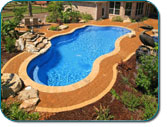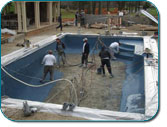Pros & Cons Fiberglass vs. Concrete / Gunite Swimming Pools
Here are some of the pro’s and con’s of vinyl liner, gunite (concrete) and fiberglass pools. For more pros and cons of DIY fiberglass pools, please feel free to browse through our website or contact our fiberglass pool professionals.
Latham Fiberglass Swimming Pools
Latham Fiberglass Pool Pro’s
 Quick installation(3-5 days). Permanent home improvement that can be customized to compliment your home and your lifestyle. Proven product with factory controlled quality. Flexural strength that prevents cracking in freeze-thaw climates. Stronger than concrete. Smooth finish means no skin abrasions. Non-porous surface resists the problems associated with imbalanced water chemistry, requiring less chemical maintenance, labor, electric, and is algae resistant. Most pool options available perimeter tile, inlaid tile, tile mosaics, Crystite® pool finishes, built-in water features like cascades and streams, fiber optic and LED lighting, vanishing edges, and in-floor cleaning systems.
Quick installation(3-5 days). Permanent home improvement that can be customized to compliment your home and your lifestyle. Proven product with factory controlled quality. Flexural strength that prevents cracking in freeze-thaw climates. Stronger than concrete. Smooth finish means no skin abrasions. Non-porous surface resists the problems associated with imbalanced water chemistry, requiring less chemical maintenance, labor, electric, and is algae resistant. Most pool options available perimeter tile, inlaid tile, tile mosaics, Crystite® pool finishes, built-in water features like cascades and streams, fiber optic and LED lighting, vanishing edges, and in-floor cleaning systems.
Latham Fiberglass Pool Con’s
Limited size and shapes
Latham Fiberglass Pool Eco-Awareness
Fiberglass pools act as a natural insulator, requiring less electric/gas to heat the pool. Algae is less prone to attach to the smooth surface of a fiberglass pool, requiring less chemicals and maintenance.
Latham Fiberglass Pool Billable Maintenance
Chemicals, Electric Cost
Latham Fiberglass Pool Maintenance Cost for 10 Years
Gunite (Concrete) Swimming Pools
Gunite (Concrete) Pool Pros
Unlimited design capabilities. Permanent home improvement.
Gunite (Concrete) Pool Con’s
 4-8 week installation by subleased contractors. Concrete shows through around the pool’s etching (edge). The surface is rough and abrasive and also stains and discolors easily. The porous surface is a breeding ground for algae and other micro-bacteria. Cracks in freeze-thaw climates and requires acid washing and re-plastering. High maintenance; monthly pool service required, excessive use of chemicals and electricity.
4-8 week installation by subleased contractors. Concrete shows through around the pool’s etching (edge). The surface is rough and abrasive and also stains and discolors easily. The porous surface is a breeding ground for algae and other micro-bacteria. Cracks in freeze-thaw climates and requires acid washing and re-plastering. High maintenance; monthly pool service required, excessive use of chemicals and electricity.
Gunite (Concrete) Pool Eco-Awareness
Acid baths emit fumes into the atmosphere. Re-plastered waste adds to our landfills.
Gunite (Concrete) Pool Billable Maintenance
Chemicals, Electric Cost, Acid Baths, Re-plastering, New Tile, Pool Service
Gunite (Concrete) Pool Maintenance Cost for 10 Years
$26,950
Exploring the Diversity of Fiberglass Pools
When considering fiberglass pools, the variety of shapes and sizes available can accommodate almost any backyard design. With their sleek pool shells, these swimming pools offer a lower lifetime cost compared to traditional types of pools. The non-porous pool surface is designed to minimize algae growth, reducing maintenance costs and effort. Homeowners looking to understand the long-term implications, from initial installation to decades of use, will find the fiberglass vs concrete pools comparison particularly insightful.
Weighing Your Options: Fiberglass vs. Vinyl vs. Concrete
Deciding between the pros and cons of various pool designs is critical when planning your pool installation. Fiberglass pool installation is renowned for its swift turnaround and low initial cost compared to a concrete or gunite pool. The smooth interior surface of a fiberglass swimming pool not only feels comfortable to the touch but also discourages algae adherence, simplifying pool care. For a comprehensive understanding of the pros and cons of a fiberglass pool, especially in comparison to a vinyl pool or concrete options, our specialists are ready to guide you through the details.
Costs and Considerations: Making an Informed Decision
Homeowners are often curious about pools typically used in their region, and whether gunite vs fiberglass pool options are better suited to their climate and lifestyle. Each pool type presents unique features: fiberglass pools offer a balance of durability and ease of maintenance, whereas gunite pools provide unparalleled customization. By examining the total costs over a 10-year span, including chemical, electric, and service costs, the economic benefits of choosing fiberglass become apparent, especially when considering the resilience and low maintenance requirements of its surface.
Understanding Fiberglass Pools: Advantages and Considerations
Fiberglass pools offer a host of benefits that make them a popular choice among pool owners, particularly for their lower maintenance cost and ease of installation. Unlike concrete pools, fiberglass swimming pools come with a smooth gel coat surface that significantly reduces the need for acid washing and frequent liner replacing, which are common in concrete and vinyl liner pools. This non-porous surface not only minimizes algae growth but also reduces the chemical usage needed to maintain pool water balance, thereby enhancing the overall pool experience with less upkeep and lower lifetime costs. Additionally, fiberglass pool designs are available in various shapes and sizes, ensuring that there is a perfect fit for almost any backyard space.
Comparing Pool Types: Fiberglass Versus Concrete and Vinyl
When weighing the pros and cons of fiberglass pools against other types of pools like gunite (concrete) or vinyl liner pools, it is important to consider both the initial and long-term financial implications. Fiberglass pools typically have a faster installation process and lower initial costs compared to gunite pools, which require more complex construction techniques and longer installation times. The smooth interior finishes of fiberglass pools not only provide comfort but also discourage algae adherence, which simplifies maintenance routines and reduces ongoing costs. For those considering their options like custom pool shells and fiberglass pool shells, understanding the differences in pool installations like in winter safety covers, maintenance requirements, and the longevity of each pool type is crucial in making an informed decision that aligns with their budget, lifestyle, and aesthetic preferences.
Learn more about fiberglass inground swimming pool kits, inground fiberglass swimming pool installation, and small fiberglass pool shell here at Calm Water Pools.
